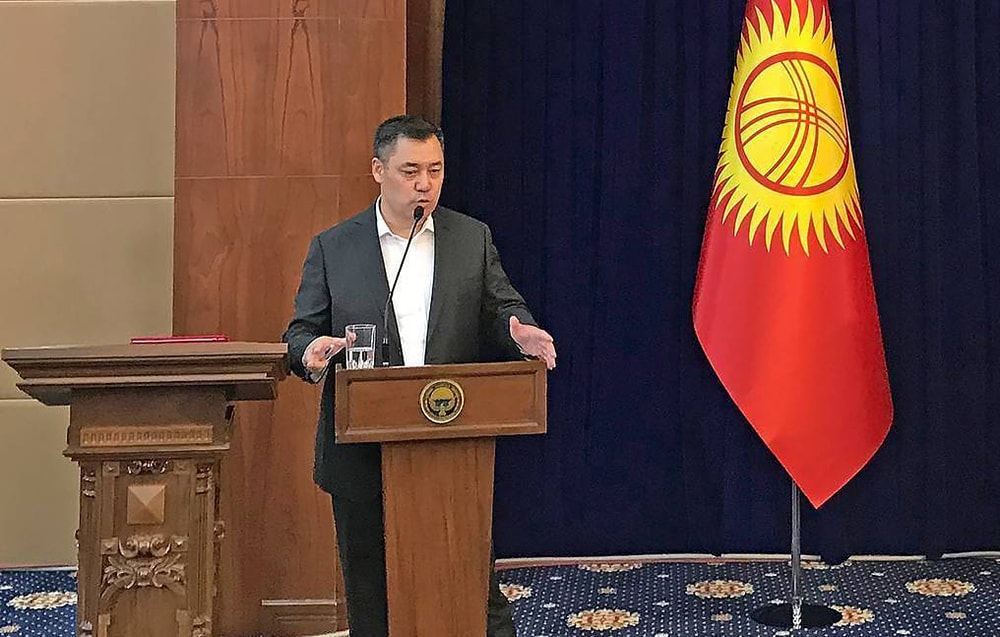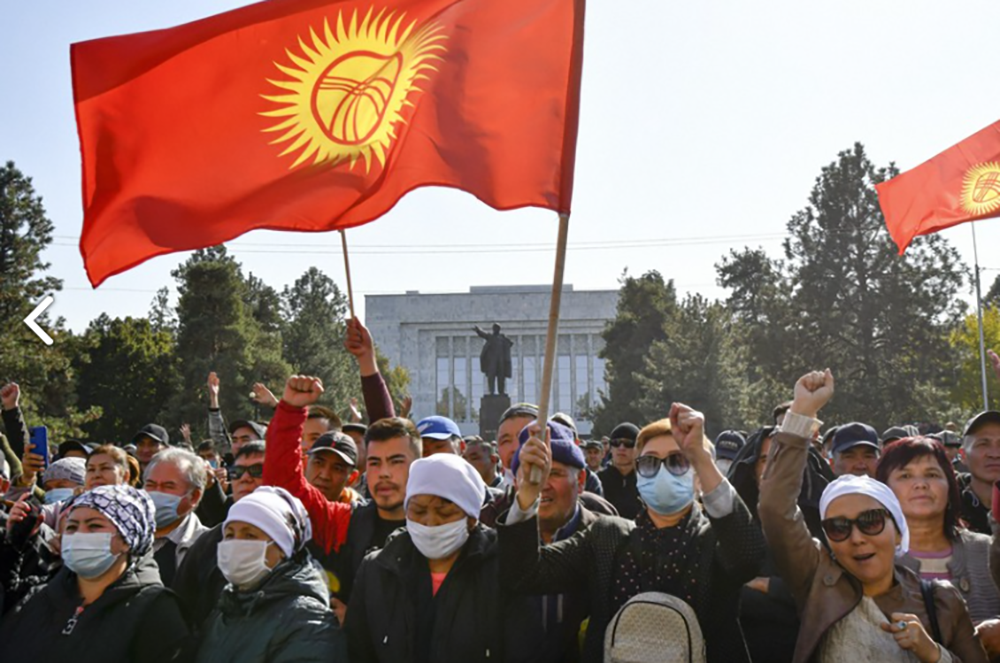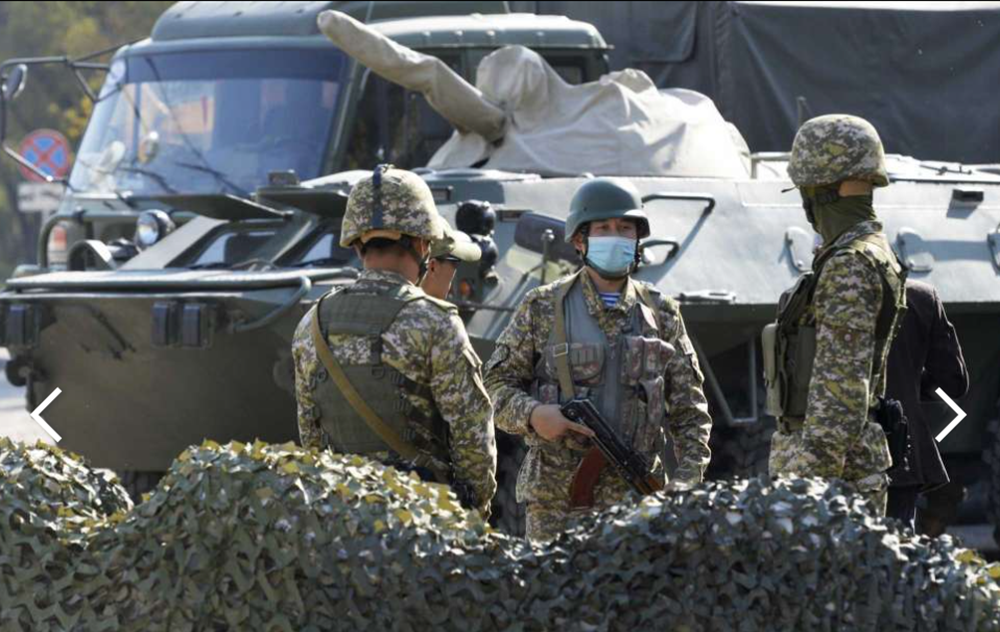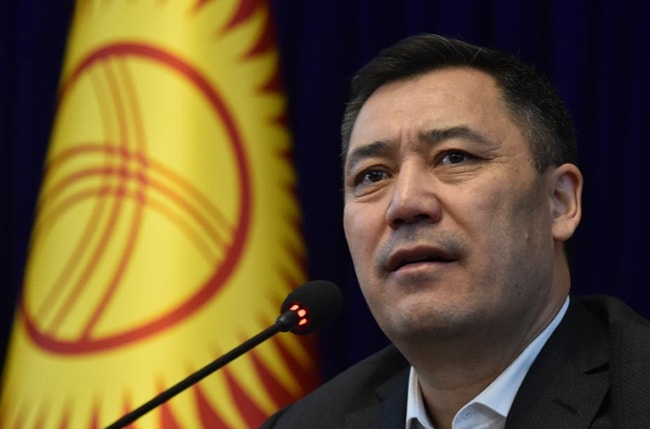Sadyr Zhaparov - From prisoner to new Prime Minister
(Baonghean.vn) - Although he has the advantage of receiving a lot of support from the people, in the current context, the challenge facing new Prime Minister Sadyr Zhaparov is extremely great.
In an effort to end the political crisis inKyrgyzstanAfter the October 4 election, the country's parliament had to vote for a second time to approve Sadyr Zhaparov - a nationalist politician - to officially become the Prime Minister of this Central Asian country. Having just been released from prison for taking hostages with a sentence of more than 11 years, the 51-year-old former legislator immediately faced a series of challenges both domestically and internationally.
 |
| New Kyrgyzstan Prime Minister Sadyr Japarov speaks on October 10. Photo: Tass |
PRIME MINISTER FROM THE SHADOWS
On Tuesday, Sadyr Zhaparov, a former lawmaker known for his hardline nationalism,Former President Almazbek Atambayevwas freed from prison by supporters along with several other prominent politicians.
However, while Mr. Zhaparov's "political star" appeared with the decision to become Prime Minister, former President Atambayev was immediately raided and arrested by police and security forces outside the capital Bishkek. The State Committee for National Security also confirmed the arrest on charges of organizing disturbances.
Mr. Zhaparov emerged as a leading figure in the recent crisis in Kyrgyzstan.
It should be recalled that on October 4, Kyrgyzstan held elections for the 120-seat National Assembly. According to preliminary results, only 4 parties out of 16 contesting parties won more than 7% of the votes to be represented in the National Assembly. However, opponents said that there were many violations in the election, leading to a wave of violent protests. Protesters stormed and occupied government buildings, looted some offices, causing many casualties.
Faced with these complicated developments, the Central Election Commission of Kyrgyzstan later annulled the election results, and Prime Minister Kubatbek Boronov resigned. Then, on October 10, the Kyrgyzstan Parliament voted to elect Mr. Sadyr Japarov as the new Prime Minister.
Mr Zhaparov, a former adviser to former President Bakiyev, emerged as a leading figure in the recent crisis in Kyrgyzstan, when he made a claim for the position of Prime Minister - even before President Sooronbay Jeenbekov signed the resignation of former Prime Minister Kubatbek Boronov.
 |
| Protesters wave flags in support of new Prime Minister Sadyr Zhaparov in the capital Bishkek on October 14. Photo: AP |
On October 13, President Jeenbekov announced that he would not accept Japarov’s appointment as prime minister, citing doubts about whether lawmakers had followed voting rules. In addition, Japarov was sentenced in 2017 to 11.5 years in prison for hostage-taking and other crimes, but the sentence was overturned by a court less than a day after his release.
UNStable future
Before being appointed as Prime Minister, Mr. Sadyr Zhaparov called for constitutional reform before the new presidential and parliamentary elections. In a recent statement, the new Prime Minister said that President Sooronbai Jeenbekov is expected to resign “in the next 2 to 3 days”. According to observers, Mr. Zhaparov will likely become acting President if Jeenbekov resigns. Although he has the advantage of receiving a lot of support from the people, in the current context, the challenge for new Prime Minister Sadyr Zhaparov is extremely great!
Kyrgyzstan hasa turbulent history whenhas seen two presidents overthrown by protests.
Internally, the immediate difficulty lies in the fact that Kyrgyzstan's lawmakers have approved a "hard" cabinet list that is unlikely to change, although new Prime Minister Zhaparov has said he plans to appoint young politicians to top positions in the future. Not to mention, the country's politics is heavily divided between dozens of parties representing different interests. This reality stems from a turbulent history when Kyrgyzstan has seen two presidents toppled by protests since independence from the Soviet Union.
 |
| Kyrgyzstan President Jeenbekov had to declare a new week-long state of emergency in the capital earlier this week in the face of protests by the people. Photo: AP |
The first was the “Tulip Revolution” in 2005, which took place just months after the color revolutions in Georgia in late 2003 and Ukraine throughout 2004. Kyrgyzstan’s then-president, Askar Akayev, who had run the country since 1990, faced severe unrest. He was then ousted after a third election that ended amid allegations of widespread voter fraud and electoral fraud. His successor, Kurmanbek Bakiyev, was also ousted in 2010 after five tumultuous years in power.
Meanwhile, Kyrgyzstan is also a country with a geostrategic position, attracting the attention of many major countries. This country currently hasRussian military air baseand is also a trading hub with neighboring China. The former Soviet republic, with a population of 6.5 million, is also home to a strong mining operation by Canadian companies.
Therefore, in the face of instability in Kyrgyzstan, ally Moscow warned of deep concern about the “mess” in this country. Russia clearly does not want to add to the concerns that have piled up with protests in neighboring ally Belarus or the war in the Nagorno-Karabakh region betweenArmenia and Azerbaijan.
 |
| New Kyrgyzstan Prime Minister Sadyr Zhaparov faces numerous challenges. Photo: Al Jazeera |
Russia is also facing pressure from China and Turkey to compete for influence with neighboring countries and allies in the post-Soviet space. The crises in Kyrgyzstan or Belarus are clearly disrupting Russia's plans in Eastern Europe and Central Asia. Meanwhile, worried about political chaos, Türkiye with strategic interests is also closely monitoring developments, not excluding the possibility of "intervening" as it did in the Nagorno-Karabakh conflict when it publicly declared its support for Azerbaijan!
In the face of the wave of competition for influence among major powers, the new Prime Minister Sadyr Zhaparov’s government perhaps needs more than ever to demonstrate a truly clear role but also needs to be tactful so as not to offend any side. That is not to mention the challenge of “settling” the still too chaotic internal political scene in Kyrgyzstan. Even Mr. Zhaparov’s political future is not entirely certain!
